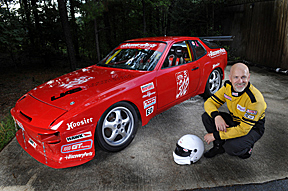Tim Nagy, Ph.D., fights cancer wearing two uniforms. The first is his lab coat, which he wears as a UAB Comprehensive Cancer scientist and vice chair for research in the UAB Department of Nutrition Sciences. The second uniform includes a helmet.
 |
| Tim Nagy, vice chair for research in the Department of Nutrition Sciences, recently competed in the driver-pledge competition “Accelerating a Cancer Cure,” which raised $4,790 for the Comprehensive Cancer Center. |
“I was one of three driving for the Cancer Center in an eight-hour endurance race at Road Atlanta in December 2008,” he says. “We raised money for every lap we completed, which added up to a couple thousand dollars.”
Nagy competed in the driver-pledge competition “Accelerating a Cancer Cure” Nov. 14-15 at Barber Motorsports Park to raise more research funds for the Cancer Center. Nagy is one of the founders of “Accelerating a Cancer Cure.”
Four drivers, including Nagy, raised $4,790 from the event.
The hormone link
Off the track, Nagy is driven to find answers about the connections between obesity and cancer. He joined UAB’s faculty 15 years ago after earning biology degrees in Pennsylvania and Utah and completing postdoctoral work — focusing on endocrinology at Delaware and energy metabolism and body composition at UAB. Today he is the vice chair for research in the Department of Nutrition Sciences and investigates the reasons obese individuals are more likely to die from cancer than their leaner counterparts.
“Many people thought an increase in food consumption confers this risk,” Nagy says. “That’s certainly possible, but our research so far suggests that elevated risk is actually caused by addition of body fat. Scientists no longer think of body fat as tissue that just holds excess calories, holding energy in reserve. In fact, extra body fat is an endocrine tissue that produces hormones. As you increase the amount of fat, certain hormones are produced in excess, and other hormones are produced less. We think that many of these hormones may play a role in the discrepancy in mortality rates.”
One of those hormones, leptin, is produced in very high amounts in obese individuals, and it fosters cancer-cell growth by allowing blood vessels to grow and feed tumors, Nagy says. Another hormone, adiponectin, decreases as obesity increases — and the lack of it may also encourage cancer.
Unlike leptin, adiponectin can inhibit cell growth by limiting the expansion of blood vessels. In other words, says Nagy, obesity may provide tumors with an environment where they can grow and flourish, while leanness starves them.
The science of obesity
The incidence of cancer is not always related to obesity, but obesity does increase the risk for certain types of cancer, including postmenopausal breast cancer and endometrial and prostate cancers.
“But in almost all cancers,” Nagy says, “mortality is increased if you’re obese.”
And gender offers no protection; both obese men and women have higher cancer death rates.
Findings from a current research project suggest that losing weight leads to better control of cancer-cell growth, Nagy adds. In a study of women who were mildly overweight and then reduced their weight to normal levels, Nagy and his team found that “in the overweight state, cancer cells tend to grow better. The cell cycle and cell division tends to go more quickly, and there’s less cell death in the overweight state compared to the normal-weight state of the same woman. In the normal-weight state you see more apoptosis, or cell death, which means there’s better control of the cell cycle and cellular regulation.”
A new project will study obesity’s relationship to metastatic disease, Nagy adds.
“This is a really important area because people mostly die from metastatic disease rather than initial tumors,” he says.
The studies could benefit patients in multiple ways, adds Nagy, who also directs UAB’s Division of Physiology & Metabolism.
“Understanding the hormones and other physiological factors involved in the weight-gain-weight-loss loop might help us devise methods to change them,” he says. “If we know a certain hormone is involved, drugs might be developed to limit production of that hormone.”
Hot wheels
UAB is “a terrific environment for conducting scientific work,” Nagy says. And he enjoys living in Birmingham. His wife Fran is a potter who operates Imagine Clay Studio.
Then there’s the racing. Nagy says he got hooked one weekend about five years ago when he enrolled in a high-performance driver’s education course in Atlanta. Before long, he had his own racecar — a 1998 Porsche 924S — and had become a driving instructor himself.
“Then I wanted to do a little more, so I participated in time trials,” he says. “That was a lot of fun and paved the way for my entry into racing. Now I participate in club racing at places like Barber Motorsports or at Road Atlanta.”
Nagy does all of the maintenance and repair work on his Porsche himself. “I thought that if I could do science, then I could probably work on a car,” he says. “Now, my family lovingly refers to my garage as ‘man haven.’ ”